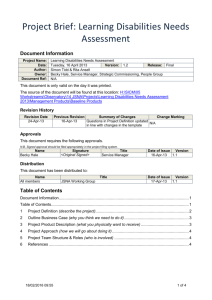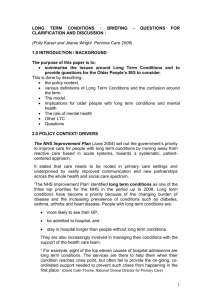Commissioning for Personalisation - Colin Rowett
advertisement
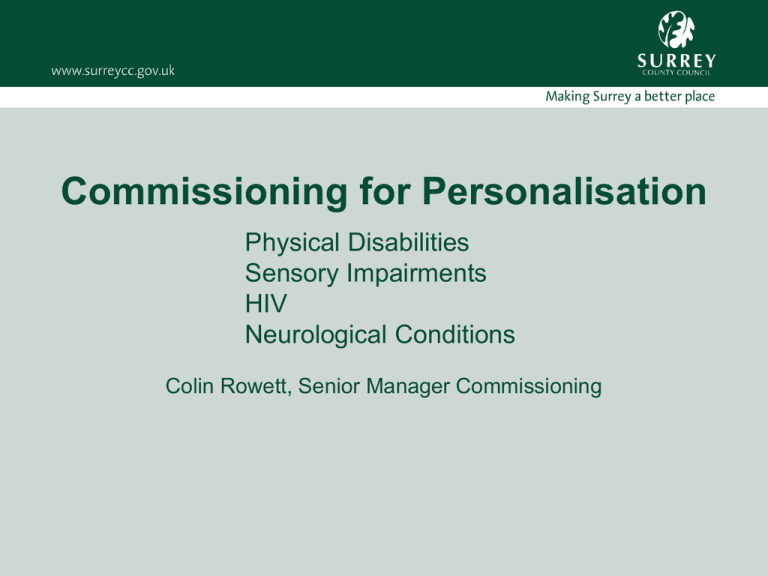
Commissioning for Personalisation Physical Disabilities Sensory Impairments HIV Neurological Conditions Colin Rowett, Senior Manager Commissioning Commissioning for Personalised Services: Concept Personalisation is about giving people much more choice and control over their lives and goes well beyond simply giving personal budgets to people eligible for council funding. It means addressing the needs and aspirations of whole communities to ensure everyone has access to the right information, advice and advocacy to make good decisions about the support they need. It means ensuring that people have wider choice in how their needs are met and are able to access universal services such as transport, leisure and education, housing, health and opportunities for employment, regardless of age or disability. Commissioning: Principles Work in partnership and commission jointly where it makes sense to do so Develop service models which are person centred Ensure equity of access and delivery Demonstrate value for money Look for innovation which improves quality and outcomes Manage performance proportionately Manage knowledge and share it Commissioning for Personalised Services: Goals 1. 2. 3. 4. 5. 6. 7. Correct balance of investment between different services Developing the market so services are available for personal budget holders and self funders Available information and advice Co-production, including design, delivery and evaluation of services Local partnerships Commissioning prevention and wellbeing services Access to universal community services Overview Focus Implement Review Block/ framework contract 2013/14 Block/ framework contract 2013/14 Social enterprise/CIC 2013/14 Social enterprise/CIC 2013/14 Prime contractor 2014/15 Contract 2013/14 JSNA Analyse Plan Visual impairment Dual sensory loss Hearing impairment Deaf BSL 1. Sensory loss (Joint with NHS Surrey) 2. HIV/ AIDS (Joint with NHS Surrey) 3. Integrated Community Equipment Service (Joint with NHS Surrey) 4. Neurological conditions 5. Military and Veterans Health (draft) 6. Mobility impairment and Musculoskeletal conditions TBA 7. Integrated equipment/ adaptation service TBA TBS Neurological Conditions: Commissioning Intentions WE NEED LESS: • Residential care • Standard, 9am to 5pm, Monday to Friday day care services WE NEED: • Equitable and timely access to a wide range of local services • Personal budgets and direct payments so people can exercise more choice and control over their support • Opportunities for retraining, vocational rehabilitation, support for returning to work, employment, leisure pursuits and social participation • Improved access to 24-hour specialist care and support for those with complex health and social needs • Flexible community services and support, and an increased range of service options to support people at home • Support to navigate the complex health and social care systems and help people achieve their individual outcomes in life • To maximise the use of telecare, telehealth and digital technology • One stop shops and information and advice services • Clear integrated pathways of care, including timely access to reablement and rehabilitation Neurological Conditions: Pathway Stage Objective Changes (examples) 1. Early and accurate. Quality managed treatment, care and support Training, diagnostics, referral routes, telehealth, information, contact/ advisor/ advocate, access to ‘newly diagnosed’ courses 2. Early treatment Integrated assessment. Symptom control. Treatment Carers awareness training, planned breaks, specialist neuro-rehabilitation, self management programmes, neuropsychology pathway 3. Living with LTNC Joint health and social care programmes Care plans as passport to commissioned services, Community clinics, planned medication reviews, rehabilitation, equipment available, in-reach to support care homes, employment pathway, 24/7 access to specialist care 4. Emergency and acute management Prevent unnecessary admissions Proactive response to crises; single point of access for assessment of need for rehabilitation, care and support as close to home as possible 5. Palliative and end of life care Comprehensive support; die in dignity in the place of choice Within EOL pathway of the relevant organisation, reflecting personal choice in service contracts Diagnosis Neurological Services: Milestones Action Timeline 1. JSNA compete and publish Completed (www.surreyi.gov.uk) 2. Joint strategy Completed (www.surreyi.gov.uk) 3. NW Surrey Pilot: learning points November 2012 4. Establish Surrey Neurological Services Partnership November/ December 2012 5. Implementation plan December 2012 – March 2013 6. Procurement intentions April 2013


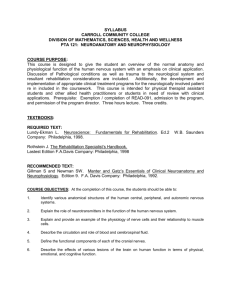



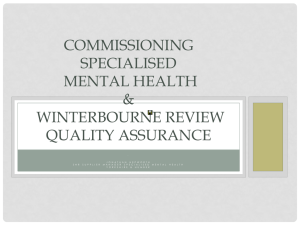
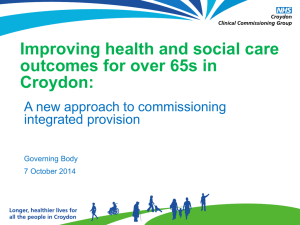
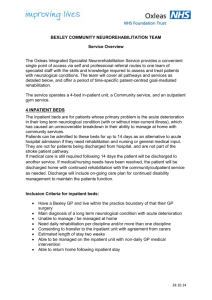
![Presentation [] - VideoGameAudio.com](http://s2.studylib.net/store/data/005720670_1-cf726d95b294f1b37f6f005235b97679-300x300.png)
